

Another prominent musician whose first exposure to music came through his parents, Johannes Brahms first received lessons on the violin and cello from his father, a bassist in the Hamburg Philharmonic Society. He studied piano at a young age and was trained in the works of Bach and Mozart. Brahms also composed from an early age, but was somewhat notorious for destroying any composition with which he was not satisfied, including most of his early works.
While still a teenager, Brahms met and was championed by Robert Schumann, who called him the heir of Beethoven. His works were also played by Franz Liszt, leading to considerable fame across Europe. When Robert Schumann was sent to an asylum, Brahms helped the family and became a close friend of his widow, Clara Schumann.
Brahms became director of the Vienna Singakademie in 1863, settling permanently in the city a few years later. He continued composing, always in a traditional style, but with a Romantic flair. Brahms is often considered the last of the European Classical composers, since he wrote in a style that bears clear continuity with Bach, Mozart, and Beethoven. His "German Requiem" was well received, and his first symphony in 1876 was immediately described as "Beethoven's Tenth."
A German Requiem (1868)
Hungarian Dance (1868)
Symphony No. 1, movement 1 (1876)